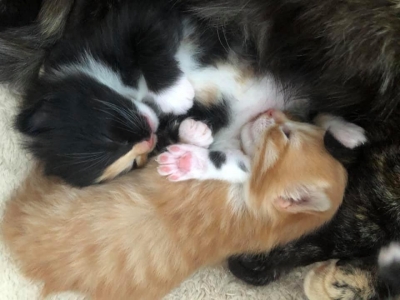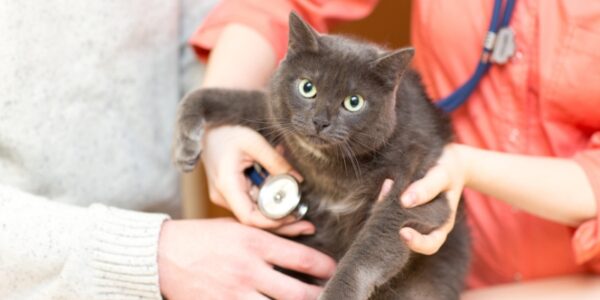It’s Spring, the season of adorable baby animals, and that means kittens are going to be out in abundance! Already, we have been inundated with requests from kind members of the public to help with small kittens that have been found in sheds and under houses. If you find yourself with a surprise family in your backyard, we have some tips to help you help them.
If you find a litter of kittens – become a covert-op spy:
If you find a litter of kittens it’s best not to assume that kittens have been abandoned. Whether it’s to hunt for food, perform perimeter checks, or just for a little break – mother cats will leave their kittens for periods of time during the day. Sometimes, she may even be in the process of moving them to a new location when you stumble across them. She will do this one at a time, and only if she thinks you aren’t looking!
The best thing you can do is observe them from a safe distance (think 15 meters at least), secret agent style. Check every hour or so to see if the mother returns. If you spy her moving her kittens about it’s best she thinks you haven’t seen her, or she’ll likely move them again for safety’s sake.
Helping the cat-family:
- If you want to help keep mum and her kittens near, it’s best to leave them untouched, but you can leave some food and water in a safe place out of reach of the litter. If mum is comfortable eating and drinking from a place near her kittens, it’s less likely she’ll have reason to leave.
- If they seem settled, it’s best to ask around (through Facebook, bulletin boards, the good old fashioned phone book) and find out if the cat and her kittens have owners.
- If you know that the cats are unowned, it’s recommended that they are trapped and handed in when the kittens are 3 weeks or older. Get in touch with your local rescue or vet for advice on how to do this in a way that won’t freak them out, or separate the family!
- Avoid separating the kittens from their mum, as they are entirely dependent on her when they are under 4 weeks old.
What to do if the mother cat has not come back:
It’s uncommon for a mother cat to leave her kittens behind. If you have observed the litter (sneakily and from afar) and you’re certain that the mother isn’t returning, then there is cause for action! Small orphan kittens under 8 weeks can be handed into vet clinics and rescue groups straight away – you can tell how old they are by how they look:
- Newborns: completely helpless, their eyes are closed and their ears are folded. They can’t stand, eat or toilet on their own, and they also can’t regulate their own heat.
- 1 Week: kittens are starting to open their eyes, and to become more aware of their surroundings. Their ears will start to unfold and they will wiggle around on their own a little more. They still depend on regular feeds and toileting from mum.
- 2 Weeks: Eyes and ears are open, and you’ll start to hear little mewling sounds coming from them as they discover their surroundings. They have begun kneading, and still can’t retract their little claws. They still depend on regular feeds and toileting from mum.
- 3 Weeks: You can tell by now if the kittens are boys or girls, their teeth are coming in and their walking is becoming more confident. They will start toileting themselves, and will be more active and mobile. Some wet food can be eaten.
- 4 Weeks: Kittens are sturdier, playing with each other, toys and people.
- 5 Weeks: Kittens now have a measure of independence, and will be more active – their personalities will begin to show through, they will likely be exploring a lot. They will climb and run and will be interested in solids.
- 6 Weeks: Kittens are mobile now, can eat cat food – although they will want mum for comfort and some feeds.
If you need to move kittens who are up to 5 weeks old, they should be placed in a box (good air ventilation is a must) with blankets or towels, ideally with a warm hot water bottle underneath. Abandoned kittens should be handed to your vet or a rescue group who can care for them, because when they are young need constant attention and care.
They are lactose intolerant, and will need specialised formula made to imitate their mother’s milk. They will need regular feeds, every 2 hours if they are under 2 weeks, every 3 hours if they are 3 weeks, and every 4 hours if they are 4-5 weeks!
Helping cats and kittens where you can is a great and heartwarming thing to do – but the best thing you can do is ensure that they won’t end up homeless, and pregnant again. Finding forever homes, plus the cost of vaccinating and desexing kittens is no small task. Rescue groups will ensure that they receive the care they need, and when they are old enough – will ensure that the cats are desexed, microchipped and vaccinated. You can do your part by helping us help the kittens by donating time, money, or supplies to vet clinics, or rescue groups like our favourite cat charity Maneki Neko based right here in Melbourne.
For info about Maneki Neko, and their upcoming Kitten Shower to raise funds for rearing kittens – click here, or check them out on Facebook.




